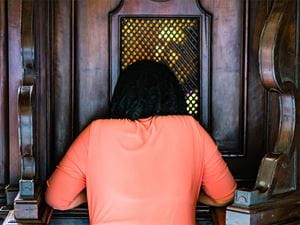
The practice of Catholic confession can be a mystery to people outside the Roman Catholic Church. While most can understand the feelings of guilt or shame that can come with bad behavior, they cannot understand how or why telling a priest about this would be necessary or helpful. Christians outside of the Roman Catholic Church find private confession directly to God more logical and meaningful.
The first way to explore this is to understand what the Church teaches about sin, which is something much deeper than moral infractions. According to the Church, sin is a rejection of God and a brokenness within the soul that needs mending. Thus, dealing with sin in the life of a believer is not just about ridding oneself of the shadow of personal mistakes; it is an act of reconciliation with God and a healing. The Church teaches that priests are mediators who are authorized to provide this reconciliation and make possible the healing. According to the Catechism, “the priest is the sign and the instrument of God’s merciful love for the sinner.”
This act is formalized in the Sacrament of Penance and Reconciliation, by which the repenting sinner returns to God and is restored to right relationship with God and with the Church. Catholics teach that confession to a priest is essential because it offers the sinner a way to be fully honest about his or her sins and to receive fully the forgiveness offered by God. Regular confession disciplines the believer to understand evil tendencies in the heart and to recognize the offer of grace that God provides through the Church.
In the Catholic Church, bishops serve as the successors to the apostles and priests are their partners in the apostolic ministry. The apostles were sent out by Christ to heal and to set people free from evil, and thus priests represent this healing and restoring act of Christ. After the resurrection, Jesus gave the apostles the Holy Spirit and taught them that they were to exercise the power of forgiveness (John 20.22-23). The priest does not impart forgiveness, or absolution, by his own power, but as a servant of Jesus Christ.
As the priest listens to confessions, he guides sinners toward true repentance, assures them of God’s mercy, and leads them to new ways of living that honor God and the Christian community. This guidance also involves the imposition of penance, which usually requires, if possible, repairing the harm done to anyone and doing something further to make amends for the sin. This could involve saying certain prayers, taking on a practice of fasting for a time, serving a neighbor, or volunteering at a charity.
Confession to a priest is always necessary for anyone who has committed a mortal sin, that is, a sin that is a grave offense against the life of God in us and that can lead to damnation. Venial sins—those offenses against God and neighbor that can wound, but not kill, these relationships—should also be confessed regularly. The priest has the power to guide the sinner in understanding the difference and in receiving the new life offered through the Holy Spirit.
3/23/2021 6:32:41 PM











